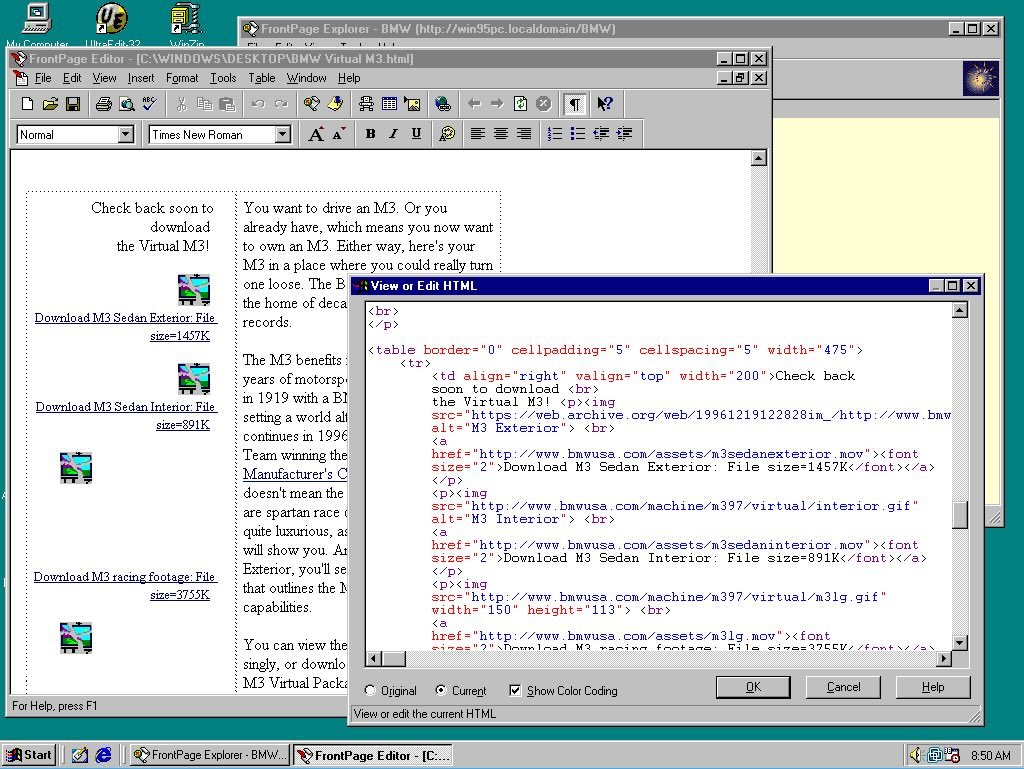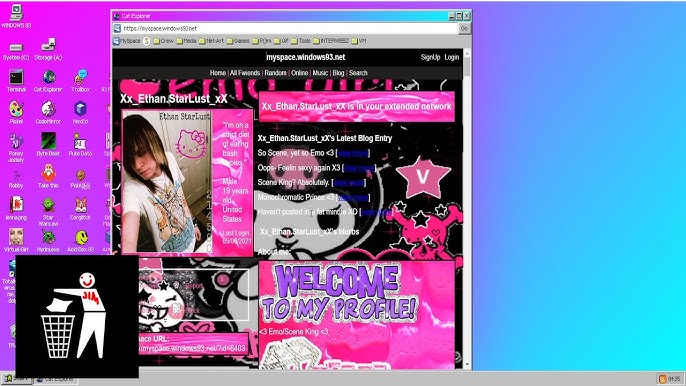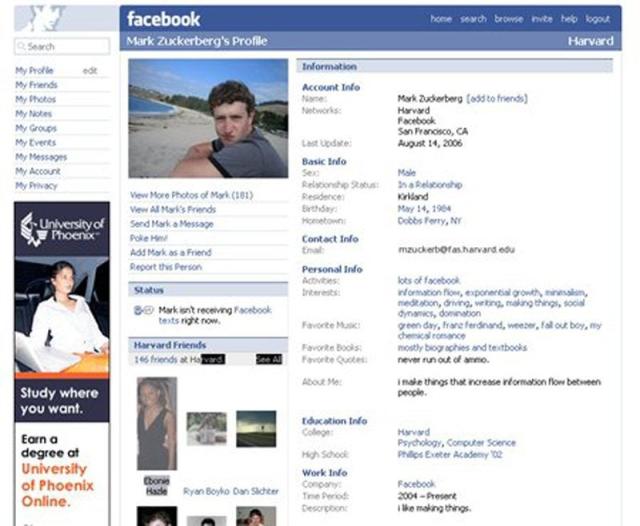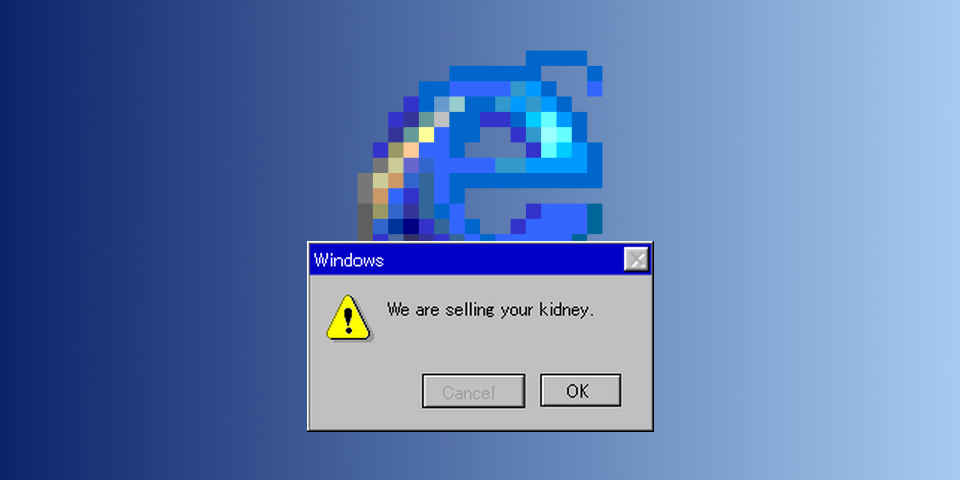Disclaimer: While this post explores rediscovering the internet, it also brings focus to the personal well-being that drives this journey.
Welcome to the Magic
I first discovered the web back in 1996. I was 8 years old, and my elementary school had a computer lab that was open to all students. Later, my older brother, who is a tech geek just like me, taught me how to tame the computer and the web in order to make some Lemonade out of them web-lemons.
To me, the Internet felt like something that was given to us by alien gods. It was magical, unapologetic, and quirky. It was an era of “repeated” background images, low-quality GIFs everywhere, and JavaScript was still in its infancy, mainly used for redirecting to other pages, websites, or opening annoying popups.
Creating your own content on the web required you to be an HTML wizard and know how to use FTP to upload your website’s files to a web hosting service, and configure an Apache HTTP server or a Microsoft PWS on your own.
I mean, you could design your website using Microsoft FrontPage Express that came with every Windows system or Macromedia Dreamweaver and export everything as HTML along with horrible, unnecessary code containing hundreds of nested <span> tags for no reason. But why would you? It was so mind-blowing to write your own HTML & CSS code and see it right on your screen, just one browser refresh away!

Web 2.0’s Rise to Dominance
Fast forward to the year 2001, Web 2.0 websites started popping up here and there. Users were able to create their own content on certain websites by commenting, writing posts, etc.
Perl, PHP and MySQL dominated the dynamic website tech stack. Back then, almost everyone had their own forums using phpBB or vBulletin, it was astonishingly easy to setup.
Social media as a concept had yet to be truly invented, aside from online blogs where people would share their lives and quench their fans’ voyeurism.
By 2003, MySpace (RIP) was founded and immediately broke the web by allowing youngsters to create their own custom personal pages for free and share their favorite stuff and feelings without the need to program at all. Customization was fun and truly allowed you to show your creepy artistic Emo side, even when you didn’t have one at all.

Yet, it was all quirky and sort of a mess until Zuck launched Facebook from his dorm room. Social media truly got its title back then. Following the people you love, sharing photo albums easily, sharing your unnecessary thoughts, poking your crush, and setting your relationship status to single seemed so cool. Little did we know that this would bring so many social disarrays in the future.
Jack also gave rise to short-form content via social media by founding the infamous Twitter (X now). It was really cool that you could share what you were doing, eating, and watching in a much more digestible type of content form. Back then, Twitter was mainly swarmed by tech geeks sharing their thoughts and lifestyle. It has gone downhill so much since then…

The Ugly Era of The Web
Nowadays, most of the web is being gatekept by large corporations and their extremely well-built, polished platforms. Think about it, how many websites, apps, or services do you visit daily? News, videos, photos, blogs, and vlogs are shared over a handful of services.
Since smartphones turned mainstream in the 2010s, and the mobile apps era has been widespread, giving anyone and everyone a center stage to spout their nonsense, we mostly visit the services placed on our homescreen, and go to other services or websites only when it is truly needed.
The small web is nearly extinct. The Internet is now a place where large corporations (and even smaller ones) are racing to get your attention. Every website has become an infinite sales catalog, and the content we consume is being tailored to get your undivided attention, even at the cost of spreading misinformation and poisoning your mind.
Of course, nowadays the web looks way more polished, performs massively better, faster, and offers vastly more technological advancements than back in the day, but it has lost its soul. Its true soul.
Living With Social Media Anxiety
As humans, our first priority in life should be taking care of our personal health and well-being. By doing so, we can take care of our loved ones, hold our lives together, be happier, and perform much better in almost every aspect.
Up until 4 months ago, this was not the case for me. After a period of a few hard years of familial and financial issues, I found myself extremely addicted to social media. It was my personal psychological getaway machine.
By checking Facebook, Instagram, Reddit, Twitter, cycling between them over and over, I found myself in this vicious cycle of not producing anything for myself or others. I was a constant doom scroller.
All of this caused me to consume so much unnecessary content that I felt, for the first time in my life, the true meaning of an Anxiety Disorder. My sleep cycle was damaged, every minor thing caused me to burst in pure anger, I lost patience, and my body deteriorated from not taking care of it whatsoever. All of these psychological issues severely affected my family, career, and decision-making ability.
It was time for a real change; Vanish and come back a different person. I needed to go Ghost Mode.
Going Ghost Mode
For those unfamiliar with the term, Ghost Mode derives from the Snapchat icon, where you can hide your location and go off-grid.
The meaning of Ghost Mode for me is that you don’t simply isolate yourself in the physical sense but remove all distractions from Internet access and social media.
I decided to try this out for 100 days. Just 100 days to see how much this could impact my life in a positive sense by quitting social media comprehensively.
On September 1st, 2024, I successfully completed my 100 days of Ghost Mode. It was a blast.
I was able to accomplish more in this short period of time than at any other time in the last decade of my life:
- Getting in shape - I built a workout routine and gained 10 pounds of muscle mass!
- Finishing my side project that I was working on since 2021 (launching soon)
- Creating a brand new personal blog website from scratch
- Improving my coding skills in general, including learning more about AI/ML
- Being more present in the moment, especially with my wife and child
Additionally, it’s safe to say that the anxiety disorder I was experiencing has gone away. I couldn’t be happier.
The thing is, I am still on the web every day. It’s an integral part of my personality and career. So this is how I came back to 2006. This is how I rediscovered the Internet.
Rediscovering The Small Web
The Internet being a part of my life, soul, and career meant that I wouldn’t completely detach from it, but replace the poisonous social media doom scrolling with something else. Something I used to love. Something that was once trendy… The small web.
Tech news? I can check HackerNews or MacRumors.
Learning new programming concepts? My favorite blogs are SwiftLee, Swift by Sundell and Fatbobman’s.
Consuming other educational information? I can read great articles on Medium or just listen to some Audiobooks and read textual books on my iPad.
Additionally, I recently discovered the service Neocities, a tribute to the old GeoCities legendary free web hosting from the 90’s-2000’s, which offers the option to create your own website for free, and guess what? Most websites created there are very 90’s like. It’s so cool!
Visiting all of these websites on a weekly basis has contributed not only to my well-being and anxiety issues, but it has also caused me to re-learn how to not expect everything to happen immediately or on-demand. The web used to update at a much slower pace, something we forgot how to embrace in this age of fast, short-form content and infinite notifications popping up everywhere.
Conclusion
While the new age of the web is far more advanced than what it used to be in the 90s and 2000s, providing us with capabilities we wouldn’t have thought possible back then, it does have some very serious downsides. The main one is that everyone wants and fights for your undivided attention.
It’s our job to make sure it doesn’t destroy our lives and well-being for things that literally provide us with minimal value (if at all).
The old web is still out there in the form of the “Small Web”. Look it up, find your niche. The web is vastly grander than you think.
